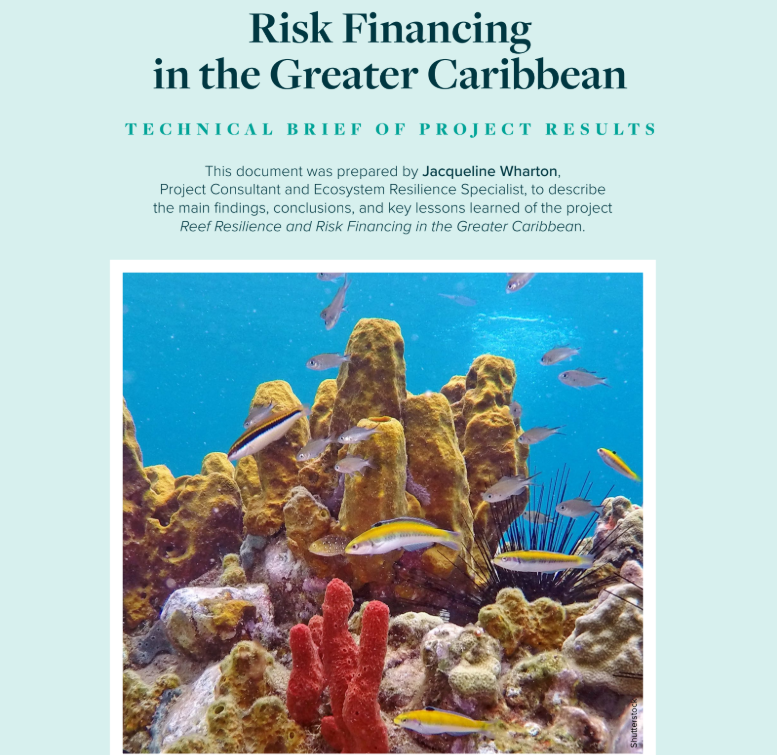MENUMENU
In the last decades, scientists and reef managers—as well as recreational divers and snorkelers—have begun to witness, with concern, the increasingly destructive impacts of hurricanes on coral reefs in the Caribbean region. While reefs have faced, and survived, the natural disturbances of hurricanes for eons, local stressors and global climate change-related threats amplify the risk of a hurricane impact leading to irreversible coral degradation and mortality.
The Reef Resilience and Risk Financing in the Greater Caribbean project enhanced the capacity of local communities, governments, the private sector, and environmental funds to increase coastal resilience using innovative financing mechanisms, such as parametric reef insurance.
The project team—made up of both regional environmental funds of the Greater Caribbean region and a global advisory firm with expertise in innovative approaches to ecosystem risk financing—enabled the diffusion of practical best practice and lessons learned in the Mesoamerican Reef (MAR) across the Greater Caribbean. This project provided additional environmental funds with access to the necessary technical expertise to develop and implement context-specific, bespoke financing mechanisms for reef resilience. The project also supported a strategic collaboration between the Mesoamerican Reef Fund (MARFund), Caribbean Biodiversity Fund (CBF), and Willis Group and Towers Watson (WTW).
The Greater Caribbean region is not only a collection of coastal communities and islands—it is an ocean-dependent economy. Coral reefs in particular are essential to tourism, fisheries, and coastal protection. They provide food security, livelihoods, and recreational opportunities, while functioning as biodiversity hotspots that offer immense global ecological value.
However, the ecosystem services these reefs provide are increasingly threatened by extreme climatic events—especially hurricanes—which cause direct physical damage and undermine reef resilience. In the face of accelerating climate change, rapid response and coordinated recovery efforts after such events are crucial.
To address this, the project supports the creation and training of Emergency Response Brigades and Response & Early Warning Coordination Committees under the Reef Rescue Initiative. Brigades—comprising women from local communities, biologists, and protected area directors—lead initial reef clean-up and restoration. Coordination Committees ensure timely action by bringing together community stakeholders and guiding post-storm operations.
The project promotes productive, reef-focused livelihood opportunities—such as tourism services centered on coral nurseries—which are particularly well-suited for female leadership and community engagement.
The successful Mesoamerican Reef (MAR) Insurance Programme, launched in May 2021, demonstrated the value of parametric insurance in reef recovery. Developed by MAR Fund, WTW, ORRAA, and the InsuResilience Solutions Fund, it provides rapid payouts after hurricane events to fund reef clean-up and restoration. The current project seeks to scale this model across the Greater Caribbean, engaging national environmental funds in innovative financing for ecosystem resilience.
Parametric insurance and contingency reserves offer breakthrough mechanisms for proactive risk management. When hurricanes generate damaging wave and storm surges, insurance payouts are triggered automatically—enabling fast, pre-planned response. This approach supports low-income populations in reef restoration efforts and enhances the long-term resilience of coastal ecosystems and communities.
Initial analysis suggests that rapid reef response activities produce a cost-benefit ratio close to 1:10 compared to delayed or no intervention. These tools allow for (i) quantifying and managing hurricane risk to reefs and (ii) pre-positioning funds to launch immediate, community-led restoration.
Coastal communities across the Greater Caribbean are increasingly vulnerable to high-intensity hurricanes, which threaten both lives and livelihoods. Coral reefs act as natural infrastructure, mitigating storm surges, beach erosion, and wave damage. In the Mesoamerican Reef (MAR), annual environmental service values are estimated at USD $183 million in fisheries, $3.9 billion in tourism, and $320–438 million in coastal protection.
Yet these reefs are facing an existential crisis. Climate change, overfishing, pollution, and unsustainable development compound the damage caused by tropical cyclones. Storms can physically destroy coral colonies and bury reefs under debris or sediment. Without intervention, such degradation reduces the reef’s capacity to provide ecosystem services, worsening the economic vulnerability of surrounding communities.
A 2018 study estimates that continued reef decline in the MAR could reduce its annual economic value by $3.1 billion by 2030. Fortunately, science-backed restoration—including post-cyclone assessments, coral replanting, and debris removal—can drastically reduce this risk and support reef recovery.
To build the capacity of communities, governments, the private sector, and environmental funds to improve coastal resilience using innovative financing mechanisms—such as parametric reef insurance. These tools enable rapid funding for reef response, helping restore ecosystem services and protect vulnerable populations after hurricanes.
Project Duration: 6 months (January–June 2022)
Financing: USD $22,250 (Stage I – MAR Fund)
The Reef Resilience and Risk Financing initiative is strengthening the Caribbean’s ability to protect and rapidly restore coral reefs after hurricanes—critical natural infrastructure that shields coastlines and supports livelihoods.
Key outcomes include:
Parametric Reef Insurance Finalized (2022):
In partnership with MAR Fund and WTW, CBF helped develop and operationalize a reef insurance mechanism that provides fast, dedicated funding for reef repair immediately following hurricane damage.
Improved Emergency Response Capacity:
Local teams in participating countries received training in reef damage assessment, rapid response, and coordination protocols—enabling quicker, more effective post-storm action.
Advanced Risk Modeling:
Custom models were created to evaluate storm impact probabilities, estimate reef loss scenarios, and inform insurance pricing and geographic targeting.
Regional Adaptability:
The mechanism has been adapted for use in multiple Greater Caribbean nations, supporting long-term scalability and integration into national climate resilience strategies.
Part of CBF’s Wider Climate Resilience Agenda:
This effort complements the CBF’s broader investments in post-disaster ecosystem restoration across the region, including targeted grants following hurricanes like Dorian and Irma.
Read more here
Curso Brigadas para Reparar Daños Causados por Huracanes en Arrecifes
Reef resilience in the Greater Caribbean

This document was prepared by Jacqueline Wharton,
Project Consultant and Ecosystem Resilience Specialist, to describe the main findings, conclusions, and key lessons learned of the project Reef Resilience and Risk Financing in the Greater Caribbean.